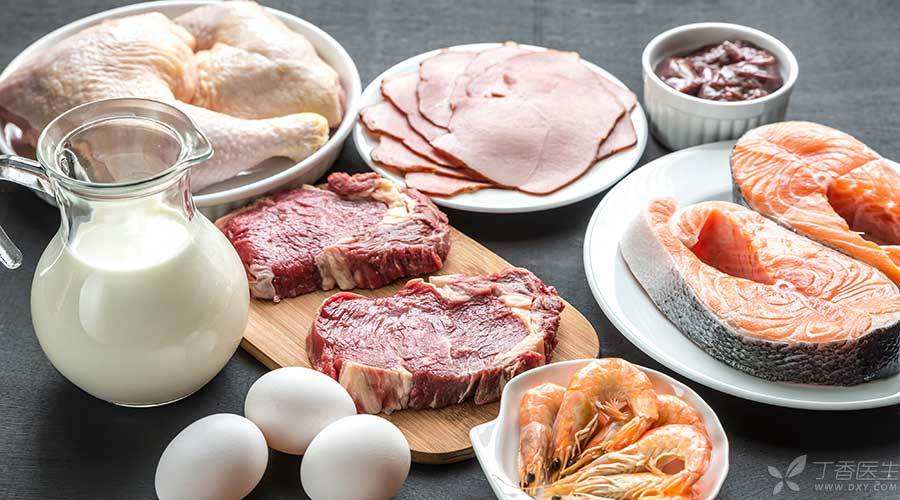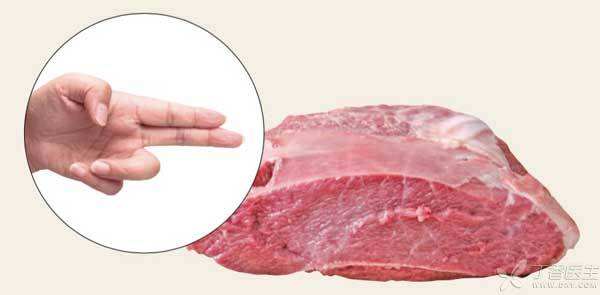
Meat, eggs and aquatic products are a very important part of a healthy diet. If meat is deliberately avoided for fear of rising hypertension, it may lead to malnutrition, which is not conducive to health.
In the daily diet, eating some meat in an appropriate amount is crucial to a balanced nutrition.
How much meat should I eat every day?
According to the Dietary Guidelines for Chinese Residents, the recommended daily intake of meat, eggs and aquatic products is 120-200g.
As for weight, the following method can be used to estimate it.
Meat, poultry

A piece of lean meat with the same thickness as the index finger and the same length and width as the middle finger of the index finger is equivalent to 25g.
Fish and shrimp

75-100 g for 7-8 shrimps.
Eggs

One egg is about 50 ~ 60 g.
Different kinds of meat can be matched every day. For example, eat an egg every day and match it with about 100g of meat.
Fish and shrimp are the first choice, followed by poultry and livestock meat. Chicken, duck and poultry meat should eat less skin and lean meat should be selected for meat.
Does Eating Eggs Raise Cholesterol?
In the past, it was believed that eggs contain higher cholesterol, which may raise the cholesterol level in blood, so many people dare not eat eggs.
However, more and more medical research results show that the factors that affect the blood cholesterol level are very complicated, not the simple relationship of “eating more, the blood cholesterol level is high”. The amount of cholesterol in diet does not seem to be an important factor affecting the blood cholesterol content.
Therefore, for hypertension patients, it is entirely reasonable to eat an egg every day.
How to eat is more important than [eating what]
In addition to paying attention to the choice of food materials, hypertension patients deserve more attention in cooking methods.
[Less oil and less salt] is the most important cooking rule, cooking oil should not exceed 25g and salt should not exceed 6g per day. Not only are tangible oils and salts used in daily cooking, but also invisible oils and salts in various snacks, soy sauce, oyster sauce and various sauces are included.
Steaming is recommended for aquatic products
Fresh fish, shrimp and other aquatic products are steamed first, especially all kinds of marine fish. Steaming can not only preserve the nutrition in fish to the maximum extent, but also taste more delicious.
Try not to fry fish, because when oil is heated at high temperature, trans fatty acids will be produced, which is not conducive to cardiovascular health.
Skillful seasoning and less salt
If you want to put less salt and the taste of food is not weak, you need the help of other condiments.
Sour seasonings such as vinegar, tomato and lemon can improve freshness and stimulate appetite. Under the condition of adding a small amount of salt, the dishes can also taste fresh and attractive.
Allium fistulosum, ginger, garlic, coriander and other vegetables with special taste can be added according to personal preferences. When making soup and stew, little salt can make the taste more delicious.
Before making meat and fish, you can marinate with spices such as spiced powder, star anise, dried tangerine peel and prickly ash, and you can use less soy sauce and salt.
Avoid pickling meat
Pickled meat such as ham, sausage and salted fish will be preserved with a large amount of salt during processing. The salt content of this kind of food is very high and can be avoided as much as possible.
Vegetarian diet can use bean products instead of meat.
Soybean protein content is quite high, and it is a very high-quality plant protein, with the title of [meat grown in the ground].
Soybean is also rich in dietary fiber, which is conducive to probiotic reproduction in intestinal tract, relieves constipation and reduces blood lipid.
Soybeans and various bean products are not only high-quality protein sources for vegetarians, but also recommended to eat more soybean products for hypertension patients and reduce the intake of some meat at the same time. Not only can high-quality protein be obtained, but also excessive intake of fat and cholesterol from meat can be avoided.
